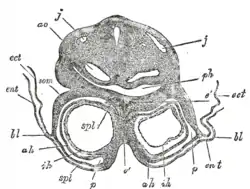| Splanchnopleuric mesenchyme | |
|---|---|
 A series of transverse sections through an embryo of the dog. (After Bonnet.) Section I is the most anterior. In V the neural plate is spread out nearly flat. The series shows the uprising of the neural folds to form the neural canal. a. Aortæ. c. Intermediate cell mass. ect. Ectoderm. ent. Entoderm. h, h. Rudiments of endothelial heart tubes. In III, IV, and V the scattered cells represented between the endoderm and splanchnic layer of mesoderm are the vasoformative cells which give origin in front, according to Bonnet, to the heart tubes, h; l.p. Lateral plate still undivided in I, II, and III; in IV and V split into somatic (sm) and splanchnic (sp) layers of mesoderm. mes. Mesoderm. p. Pericardium. so. Primitive segment. | |
 Transverse section through the region of the heart in a rabbit embryo of nine days. X 80. (Kölliker.) j, j. Jugular veins. ao. Aorta. ph. Pharynx. som. Somatopleure. bl. Proamnion. ect. Ectoderm. ent. Entoderm. p. Pericardium. spl. Splanchnopleure. ah. Outer wall of heart. ih. Endothelial lining of heart. é. Septum between heart tubes. | |
| Details | |
| Carnegie stage | 9 |
| Precursor | lateral plate mesoderm, endoderm |
| Gives rise to | mesenchyme |
| Identifiers | |
| Latin | mesenchyma splanchnopleurale |
| TE | mesenchyme_by_E4.0.4.1.0.0.4 E4.0.4.1.0.0.4 |
| Anatomical terminology | |
In the anatomy of an embryo, the splanchnopleuric mesenchyme is a structure created during embryogenesis when the lateral mesodermal germ layer splits into two layers. The inner (or splanchnic) layer adheres to the endoderm, and with it forms the splanchnopleure (mesoderm external to the coelom plus the endoderm).
See also
Post development the somato and splanchnopleuric junction lies at the duodeno-jejunal flexure.
References
![]() This article incorporates text in the public domain from page 50 of the 20th edition of Gray's Anatomy (1918)
This article incorporates text in the public domain from page 50 of the 20th edition of Gray's Anatomy (1918)
External links
- digest-022—Embryo Images at University of North Carolina
- digest-023—Embryo Images at University of North Carolina
- Overview Archived 2010-06-24 at the Wayback Machine at Kennesaw State University
This article is issued from Wikipedia. The text is licensed under Creative Commons - Attribution - Sharealike. Additional terms may apply for the media files.